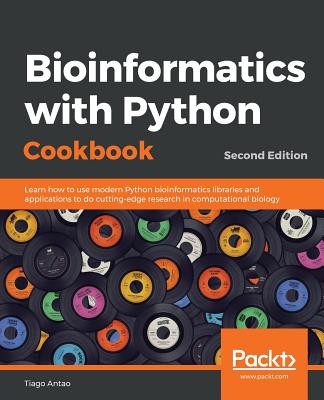
- We will send in 10–14 business days.
- Author: Tiago Antao
- Publisher: Packt Publishing
- ISBN-10: 1789344697
- ISBN-13: 9781789344691
- Format: 19.1 x 23.5 x 1.9 cm, softcover
- Language: English
- SAVE -10% with code: EXTRA
Reviews
Description
Discover modern, next-generation sequencing libraries from Python ecosystem to analyze large amounts of biological data
Key Features:
- Perform complex bioinformatics analysis using the most important Python libraries and applications
- Implement next-generation sequencing, metagenomics, automating analysis, population genetics, and more
- Explore various statistical and machine learning techniques for bioinformatics data analysis
Book Description:
Bioinformatics is an active research field that uses a range of simple-to-advanced computations to extract valuable information from biological data.
This book covers next-generation sequencing, genomics, metagenomics, population genetics, phylogenetics, and proteomics. You'll learn modern programming techniques to analyze large amounts of biological data. With the help of real-world examples, you'll convert, analyze, and visualize datasets using various Python tools and libraries.
This book will help you get a better understanding of working with a Galaxy server, which is the most widely used bioinformatics web-based pipeline system. This updated edition also includes advanced next-generation sequencing filtering techniques. You'll also explore topics such as SNP discovery using statistical approaches under high-performance computing frameworks such as Dask and Spark.
By the end of this book, you'll be able to use and implement modern programming techniques and frameworks to deal with the ever-increasing deluge of bioinformatics data.
What you will learn:
- Learn how to process large next-generation sequencing (NGS) datasets
- Work with genomic dataset using the FASTQ, BAM, and VCF formats
- Learn to perform sequence comparison and phylogenetic reconstruction
- Perform complex analysis with protemics data
- Use Python to interact with Galaxy servers
- Use High-performance computing techniques with Dask and Spark
- Visualize protein dataset interactions using Cytoscape
- Use PCA and Decision Trees, two machine learning techniques, with biological datasets
Who this book is for:
This book is for Data data Scientistsscientists, Bioinformatics bioinformatics analysts, researchers, and Python developers who want to address intermediate-to-advanced biological and bioinformatics problems using a recipe-based approach. Working knowledge of the Python programming language is expected.
EXTRA 10 % discount with code: EXTRA
The promotion ends in 20d.18:21:07
The discount code is valid when purchasing from 10 €. Discounts do not stack.
- Author: Tiago Antao
- Publisher: Packt Publishing
- ISBN-10: 1789344697
- ISBN-13: 9781789344691
- Format: 19.1 x 23.5 x 1.9 cm, softcover
- Language: English English
Discover modern, next-generation sequencing libraries from Python ecosystem to analyze large amounts of biological data
Key Features:
- Perform complex bioinformatics analysis using the most important Python libraries and applications
- Implement next-generation sequencing, metagenomics, automating analysis, population genetics, and more
- Explore various statistical and machine learning techniques for bioinformatics data analysis
Book Description:
Bioinformatics is an active research field that uses a range of simple-to-advanced computations to extract valuable information from biological data.
This book covers next-generation sequencing, genomics, metagenomics, population genetics, phylogenetics, and proteomics. You'll learn modern programming techniques to analyze large amounts of biological data. With the help of real-world examples, you'll convert, analyze, and visualize datasets using various Python tools and libraries.
This book will help you get a better understanding of working with a Galaxy server, which is the most widely used bioinformatics web-based pipeline system. This updated edition also includes advanced next-generation sequencing filtering techniques. You'll also explore topics such as SNP discovery using statistical approaches under high-performance computing frameworks such as Dask and Spark.
By the end of this book, you'll be able to use and implement modern programming techniques and frameworks to deal with the ever-increasing deluge of bioinformatics data.
What you will learn:
- Learn how to process large next-generation sequencing (NGS) datasets
- Work with genomic dataset using the FASTQ, BAM, and VCF formats
- Learn to perform sequence comparison and phylogenetic reconstruction
- Perform complex analysis with protemics data
- Use Python to interact with Galaxy servers
- Use High-performance computing techniques with Dask and Spark
- Visualize protein dataset interactions using Cytoscape
- Use PCA and Decision Trees, two machine learning techniques, with biological datasets
Who this book is for:
This book is for Data data Scientistsscientists, Bioinformatics bioinformatics analysts, researchers, and Python developers who want to address intermediate-to-advanced biological and bioinformatics problems using a recipe-based approach. Working knowledge of the Python programming language is expected.


Reviews